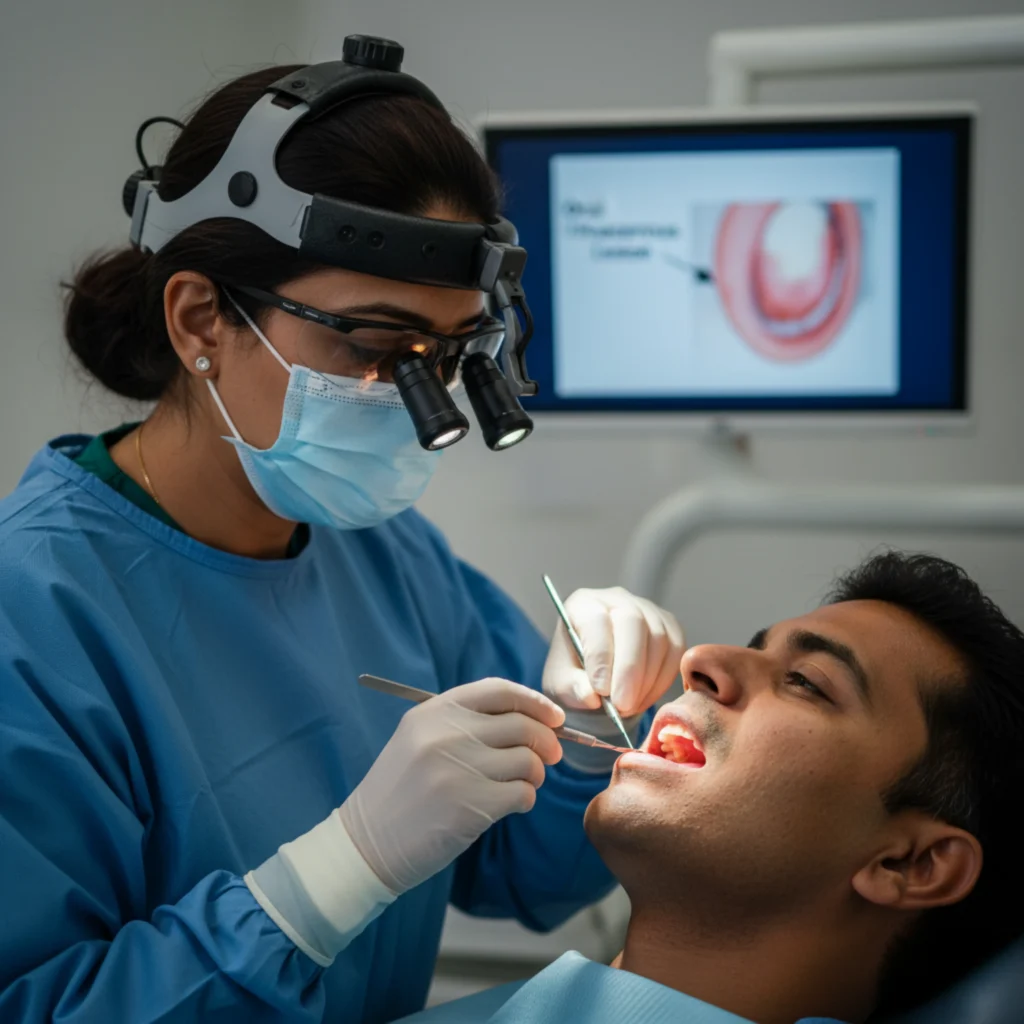Early pre-cancerous lesion treatment is essential for maintaining oral health and preventing abnormal tissue changes from developing into oral cancer. These lesions are often the first warning signs that require immediate attention. Timely consultation with a specialist ensures accurate diagnosis, effective intervention, and long-term oral wellness. Understanding the nature of these lesions, their risk factors, and available treatment options empowers patients to take proactive steps toward better oral health.
A pre-cancerous lesion treatment plan begins with identifying abnormal tissues in the mouth. Lesions can present as white patches (leukoplakia), red patches (erythroplakia), or mixed red-and-white areas. Some lesions may be subtle and painless initially, making routine oral screenings vital for early detection. Early intervention can prevent these abnormal tissues from developing into malignant conditions, safeguarding both oral and overall health.

Early identification of these lesions is critical for effective pre-cancerous lesion treatment and minimizing cancer risk.
Timely pre-cancerous lesion treatment provides numerous benefits:
Ignoring these lesions can lead to progression into oral cancer, emphasizing the importance of early evaluation and treatment.
Specialists rely on advanced diagnostic methods to provide effective pre-cancerous lesion treatment:
These diagnostic tools enable specialists to create personalized treatment plans tailored to the patient’s needs.
Treatment for pre-cancerous lesions depends on lesion type, size, and severity:
Combination treatments may be used for optimal outcomes, and follow-up care ensures long-term success.
In addition to professional pre-cancerous lesion treatment, lifestyle changes significantly impact outcomes:
Adopting these measures in combination with professional care enhances oral health and reduces recurrence risk.
Several factors increase the likelihood of developing pre-cancerous oral lesions, including:
Understanding these risk factors helps patients adopt preventive strategies alongside clinical care.
Patients should seek consultation for pre-cancerous lesion treatment if they notice:
Early evaluation by a specialist ensures timely intervention, reducing the risk of progression into oral cancer.
Selecting the right clinic is crucial for successful pre-cancerous lesion treatment. Consider the following:
A reputable clinic provides effective, reassuring, and patient-friendly treatment experiences.
Modern dentistry has revolutionized pre-cancerous lesion treatment:
These advancements make treatment safer, faster, and more efficient, ensuring optimal patient outcomes.
Timely pre-cancerous lesion treatment is crucial for preserving oral health and preventing oral cancer. Early diagnosis, individualized treatment plans, and consistent follow-ups improve patient outcomes while minimizing risks. For professional evaluation and precise management, visit Unidental, a dental clinic in Miyapur, where experienced specialists provide compassionate, comprehensive, and effective oral care solutions.
To prevent lesions from becoming cancerous while managing symptoms and maintaining oral health.
Diagnosis involves oral examination, biopsy, imaging, and lab tests to detect abnormal tissue changes.
Most procedures are minimally invasive, with local anesthesia ensuring comfort and minimal post-treatment discomfort.
Yes, recurrence is possible, so follow-up visits and lifestyle adjustments are essential.
Follow-up schedules depend on lesion type, treatment, and risk factors; visits may range from every few months to annually.
Hyderabad : +91 6305 971445
Anantapur: +91 70758 90089
Goa: +91 83266 32500
Mon to Sat 10:00AM to 8:00PM
Sun 10:00AM to 12:00PM

Our goal is to provide friendly, caring dentistry with the highest standards in general, cosmetic, and specialist treatments. We strive to be the best dental hospital for comprehensive oral care.
We use advanced dental technology to deliver safe, precise, and painless treatments for every patient.